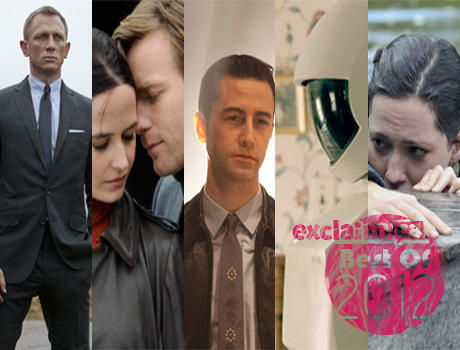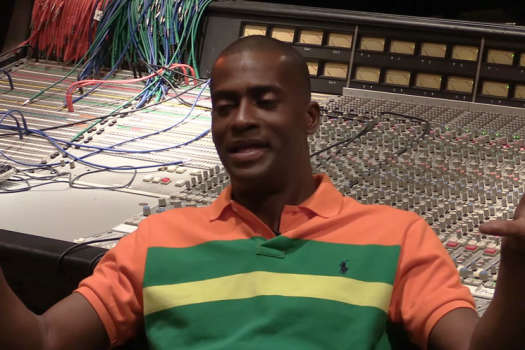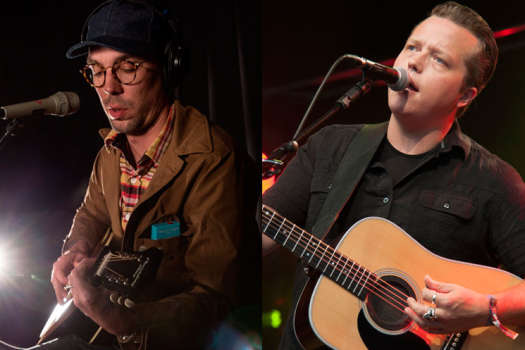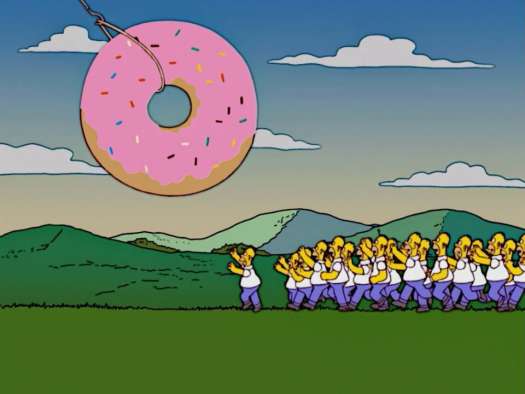The war for the Best Film of 2012 continues today with our Genre picks. Many thrilling movies were released theatrically in North America throughout 2012 but only a select few could make our year-end Top 10 list.
Exclaim!'s Best Films of 2012: Genre (Sci Fi/Horror/Action)
10. Cloud Atlas
Directed By Tom Tykwer, Andy Wachowski & Lana Wachowski
(Warner)
Time will be kind to Cloud Atlas where many critics and the general public were not. Sensibly positioned as high-concept Oscar-bait before all the ignorant bullies of the mainstream media decided to gang up on the weird kid (like Time Magazine's preposterous and glib assertion that craftsmanship this audacious and accomplished could be the "worst" anything of any year) the Wachowski siblings and Tom Tykwer's take on David Mitchell's seemingly impenetrable award-winning novel is ripe for reappraisal. The way these three talented individuals work together to arrange the story's multiple interwoven narratives as symphonic beats in a greater thematic whole is nothing short of marvellous. Sure, some of the elaborate race, age and gender-bending makeup can be distracting and comes across as a little forced, but it's gutsy and decidedly appropriate, if not always absolutely necessary for the story of souls transmuting over centuries through deliberate acts of free will. Knowing now just how futile mainstream acceptance would be, one must wonder if the directors would have opted to make a few less of the populist concessions demanded of a Tom Hanks blockbuster. Either way, the film's minor flaws and short-sighted rebelliousness are easily eclipsed by the sheer inspirational power of its story and the ambitious, masterful efforts of its cinematic midwives.
Scott A. Gray
9. Womb
Directed By Benedek Fliegauf
(Olive Films)
Nary a ripple was made by Hungarian director Benedek Fliegauf's challenging but extraordinarily tasteful and carefully paced speculative science fiction drama featuring the bold acting talents of Eva Green and Matt Smith (Doctor Who) when it was released without a theatrical run early in the year. That's as tragic as the story itself. Forgoing the typical visual signifiers of the genre, Womb takes a conceptual sci-fi approach more akin to the superb Never Let Me Go. Set at an unspecified point in the future (we can tell it's not a modern tale since the childhood versions of the leads are comfortable with cell phones) Fliegauf's discomfiting drama traces the impact of a woman's controversial decision to carry the clone of her dead lover to term and raise him as her son after he dies in a freak accident. The way their initial truncated romance unfolds makes Rebecca's (Green) choice easier to understand, but it renders that decision no less complicated. Fliegauf's unflinching examination of the not entirely wholesome bonds that can form between mother and son – not to mention the selfish reasoning behind some women's desire to give birth – is admirably subtle and brave. A brilliant, understated and uncharacteristically pastoral score by Max Richter certainly doesn't hurt either. Thought-provoking dramatic science fiction of the highest order, Womb deserves to find a much wider audience and is a strong contender for cult-classic status.
Scott A. Gray
8. The Awakening
Directed By Nick Murphy
(eOne)
As much a study of post-WWI gender and ideological shifts as it is a gorgeously photographed ghost story, Nick Murphy's The Awakening is, if anything, too smart for its own good. In plot, it follows the sceptical Florence Cathcart (Rebecca Hall) to a remote boarding school where she plans to disprove the theory of haunting. But her quest isn't just about jump scares and the traditionalist cinematic belief in miracles. She's a woman determined to spread rational, scientific theory to the masses, being scarred by the traps of superstition. In such, her character arc is that of struggle against intuition and the metaphor of ghost as forced vessel of introspection into the past. It's all handled with utmost wit and subtlety; aided by moody, impeccably composed, blue-grey cinematography that captures the melancholic, isolated feeling of the few characters sparsely roaming the halls of the potentially haunted boarding school. Of course, not having elaborate CGI, and focusing on themes more so than surface plot, limiting the audience for this truly thoughtful look at the many things we lost in the war.
Robert Bell
7. Chronicle
Directed By Josh Trank
(Fox)
Navigating the pitfalls of adolescence can seem like a monumental feat as a teenager, especially when you've been saddled with an alcoholic and abusive father. So, when Andrew and a couple of his acquaintances stumble upon a tunnel in the Earth that leads to them acquiring superpowers, it's just the kind of escape that can help alleviate some of the burden. Though the "found footage" format being employed by director Josh Trank has lost much of its novelty by this point, the decision makes for some remarkably realistic use of their abilities. From telekinesis to soaring through the air, the seamless integration of effects into the handheld camerawork has the audience sharing in the fantastic discovery along with the characters. Not content to simply show the dizzying advantages of their fortune however, the narrative allows the natural urges inherent in young men faced with such a responsibility to manifest themselves in the darkest of ways. There are hard truths to be found here in what can occur when this kind of power is at the disposal of emotionally disturbed teens; ones that we continue to see tragically playing out in headlines as we deal with the realities of guns ending up in the wrong hands.
Kevin Scott
6. Citadel
Directed By Ciaran Foy
(Mongrel Media)
Ciaran Foy's uncompromising and thoroughly intense psychological thriller Citadel starts out with an inexplicable act of violence. While moving out of his public housing above, Tommy (Aneurin Bernard) witnesses an attack on his very pregnant wife from the window of a malfunctioning elevator. Being injected in the stomach with a needle, she soon succumbs to an undefined infection, leaving a victimized and emotionally rattled Tommy to raise their baby on his own. All of this unfolds rather quickly, leaving the rest of the exceedingly visceral runtime to unfold like a living nightmare. Tommy's paranoid discomfort leaves him consistently in the role of victim, while trying to protect his baby from endless kidnapping attempts from "infected" public housing hoodlums. Since the perspective is mostly subjective, the metaphor of class system divides and the cyclic nature of slum lifestyle as an inescapable infection can be interpreted superficially or as an extremely bleak and scathing social critique. Either way, there's little denying the sheer living horror element and palpable tension of a film where nothing is predictable in world where everyone has evil potential.
Robert Bell
5. Looper
Directed By Rian Johnson
(Alliance)
In the future, time travel has been invented but is outlawed. Mobsters illicitly use it to send unwanted individuals back thirty years to be assassinated by "loopers" like Joe (Joseph Gordon-Levitt). When Joe's future self (Bruce Willis) is shipped to his younger self to be killed, things get messy, metaphysical and interesting. While perhaps not as clever or unpredictable as you might want it to be, Looper, Rian Johnson's third feature, remains a thoroughly inventive, playful and engaging futuristic action nail-biter. The film has its own lexicon but is well aware of its predecessors, nodding to sci-fi tropes and plot lines with moderation. Time travel exists as the perfect frame through which determinism and regret can be explored. Really, though, Looper is just darn good, self-aware fun, thanks in no small part to its excellent set and production design and its impeccable cast, including the charmingly surly and eternally capable Willis and Jeff Daniels in an amusingly dark turn as the bigwig mob boss Abe.
Erin O'Neill
4. Cabin in the Woods
Directed By Drew Goddard
(Alliance)
With the horror genre being so prone to derivative trends and oversaturation, it's necessary for a film to come along every so often to revitalize things. Using the most generic premise imaginable as a starting point—a group of friends vacationing at a shack in the middle of nowhere— The Cabin In The Woods' surface conceals an inspired slant on the material that has critics (including this one) walking on eggshells for fear of spoiling a good time. As familiar conventions are delightfully subverted along the way in an imaginative script co-written by Joss Whedon, moments of gripping terror mingle alongside audaciously funny ones. Bradley Whitford and Richard Jenkins are perfectly cast, emerging as an unforgettable duo in what have to be the juiciest and most slyly original antagonists seen on screen this year. Everything builds to a climax that goes off the rails in the best possible way, ambitiously attempting to recreate the essence of what lurks in the nightmares of everyone. It's a relentlessly entertaining ride throughout, delivering a welcome reminder of the sheer pleasures of scary movies even as it serves as an incisive commentary on the insatiable need many of us have to watch young and attractive people stalked by interchangeable forces of evil.
Kevin Scott
3. Robot & Frank
Directed By Jake Schreier
(Sony)
A blend of science fiction, comedy and drama, Robot & Frank focuses on an aging, dementia-suffering cat burglar named Frank (Frank Langella) and a helper robot provided to care for him. It's an aid of sorts, helping him maintain a routine rather than being shipped off to a retirement facility by his children. At the surface, this is a cute buddy comedy between an elderly man and a sassy robot (voiced by Peter Sarsgaard). Yet, when one looks beneath the goofy façade, an astute examination of memory as a make-up of identity is glaringly apparent. What sets Jake Schreier's debut film apart from other futuristically themed stories is that this future is not a dystopic nightmare or otherwise unbelievable peek into a not-to-distant time. It's a future that seems real and palpable; one where we have to figure out not just what our technology will do to us, but also what it will mean to us. In the case of Robot & Frank, technology mimics the presentation of a man's memory, which is, arguably, the most tangible asset one can have at the end of it all. In reiterating the observation that everything of present meaning is eventually replaced—libraries, technology and even ourselves—the question of progress as annihilating force arises, suggesting that it could be rendering our lives, and memories, irrelevant.
Daniel Pratt
2. Perfect Sense
Directed By David Mackenzie
(Kaboom)
Adaptability, our ephemeral nature and the pain of not realizing the importance of something until it's gone: this, in a nutshell, is what David Mackenzie's devastatingly beautiful testament to the human condition, Perfect Sense is all about. In essence, it is a love story, grounded in the tumultuous and passionate nascent romance between Michael (Ewan McGregor), a chef, and Susan (Eva Green), a Scientist. But metaphorically, the bigger story here is that of a worldwide epidemic when everyone in the world gradually loses their sense of smell after having an inexplicable emotional outburst. Initially despondent about their loss, everyone adapts, adding more salt and spice to their food, which compensates until they lose their sense of taste. This concept of loss, exacerbated by the stripping away of our sensory experience, compounds throughout the film, building up to a catharsis about the intense importance of holding onto our few human connections. It's rooted almost entirely in emotion, which is why the film received such little attention and was dismissed by image-conscious male reviewers. But for those looking for a romantic, tragic and refreshingly low key take on the metaphysical, this science fiction drama is a cut above the rest.
Robert Bell
1. Skyfall
Directed By Sam Mendes
(Sony)
Blending pulse-pounding tent-pole spectacle with cinematic high art in ways Joss Whedon didn't even attempt with 2012's other juggernaut event film (The Avengers) and Christopher Nolan fell far short of with the conclusion of his Batman trilogy, Sam Mendes maintains his nearly spotless record in the director's chair, delivering a genre masterpiece is the process. Not content with the previous Daniel Craig-era gritty reimagining of iconic British superspy, James Bond,as a dour, Jason Bourne-indebted killing machine that merely acknowledges the character's historical misogyny, Mendes takes 007 right back to the source. That doesn't just mean revitalizing the charm and gadgetry that helped the character become famous enough to reach a fifty-year anniversary in the first place—though Mendes undeniably delivers classic, yet classy, Bond-isms in spades. The Revolutionary Road director tastefully brings his insightful gender politics into the equation, fearlessly delving into the psychology of a man with serious maternal abandonment issues, but never at the expense of making a relentlessly engaging piece of mass market entertainment. Roger Deakins' cinematography is consistently breathtaking, Thomas Newman's score is appropriately epic and Javier Bardem hits just the right balance of fearsome gravitas and sympathetic monstrosity as one of the most memorable and fully realized villains in the franchise's long history. Put bluntly, Skyfall is nearly perfect, and if there was ever an action film (yes, I'm counting The Dark Knight) absolutely worthy of serious Oscar consideration, this is it.
Scott A. Gray
Exclaim!'s Best Films of 2012: Genre (Sci Fi/Horror/Action)
10. Cloud Atlas
Directed By Tom Tykwer, Andy Wachowski & Lana Wachowski
(Warner)
Time will be kind to Cloud Atlas where many critics and the general public were not. Sensibly positioned as high-concept Oscar-bait before all the ignorant bullies of the mainstream media decided to gang up on the weird kid (like Time Magazine's preposterous and glib assertion that craftsmanship this audacious and accomplished could be the "worst" anything of any year) the Wachowski siblings and Tom Tykwer's take on David Mitchell's seemingly impenetrable award-winning novel is ripe for reappraisal. The way these three talented individuals work together to arrange the story's multiple interwoven narratives as symphonic beats in a greater thematic whole is nothing short of marvellous. Sure, some of the elaborate race, age and gender-bending makeup can be distracting and comes across as a little forced, but it's gutsy and decidedly appropriate, if not always absolutely necessary for the story of souls transmuting over centuries through deliberate acts of free will. Knowing now just how futile mainstream acceptance would be, one must wonder if the directors would have opted to make a few less of the populist concessions demanded of a Tom Hanks blockbuster. Either way, the film's minor flaws and short-sighted rebelliousness are easily eclipsed by the sheer inspirational power of its story and the ambitious, masterful efforts of its cinematic midwives.
Scott A. Gray
9. Womb
Directed By Benedek Fliegauf
(Olive Films)
Nary a ripple was made by Hungarian director Benedek Fliegauf's challenging but extraordinarily tasteful and carefully paced speculative science fiction drama featuring the bold acting talents of Eva Green and Matt Smith (Doctor Who) when it was released without a theatrical run early in the year. That's as tragic as the story itself. Forgoing the typical visual signifiers of the genre, Womb takes a conceptual sci-fi approach more akin to the superb Never Let Me Go. Set at an unspecified point in the future (we can tell it's not a modern tale since the childhood versions of the leads are comfortable with cell phones) Fliegauf's discomfiting drama traces the impact of a woman's controversial decision to carry the clone of her dead lover to term and raise him as her son after he dies in a freak accident. The way their initial truncated romance unfolds makes Rebecca's (Green) choice easier to understand, but it renders that decision no less complicated. Fliegauf's unflinching examination of the not entirely wholesome bonds that can form between mother and son – not to mention the selfish reasoning behind some women's desire to give birth – is admirably subtle and brave. A brilliant, understated and uncharacteristically pastoral score by Max Richter certainly doesn't hurt either. Thought-provoking dramatic science fiction of the highest order, Womb deserves to find a much wider audience and is a strong contender for cult-classic status.
Scott A. Gray
8. The Awakening
Directed By Nick Murphy
(eOne)
As much a study of post-WWI gender and ideological shifts as it is a gorgeously photographed ghost story, Nick Murphy's The Awakening is, if anything, too smart for its own good. In plot, it follows the sceptical Florence Cathcart (Rebecca Hall) to a remote boarding school where she plans to disprove the theory of haunting. But her quest isn't just about jump scares and the traditionalist cinematic belief in miracles. She's a woman determined to spread rational, scientific theory to the masses, being scarred by the traps of superstition. In such, her character arc is that of struggle against intuition and the metaphor of ghost as forced vessel of introspection into the past. It's all handled with utmost wit and subtlety; aided by moody, impeccably composed, blue-grey cinematography that captures the melancholic, isolated feeling of the few characters sparsely roaming the halls of the potentially haunted boarding school. Of course, not having elaborate CGI, and focusing on themes more so than surface plot, limiting the audience for this truly thoughtful look at the many things we lost in the war.
Robert Bell
7. Chronicle
Directed By Josh Trank
(Fox)
Navigating the pitfalls of adolescence can seem like a monumental feat as a teenager, especially when you've been saddled with an alcoholic and abusive father. So, when Andrew and a couple of his acquaintances stumble upon a tunnel in the Earth that leads to them acquiring superpowers, it's just the kind of escape that can help alleviate some of the burden. Though the "found footage" format being employed by director Josh Trank has lost much of its novelty by this point, the decision makes for some remarkably realistic use of their abilities. From telekinesis to soaring through the air, the seamless integration of effects into the handheld camerawork has the audience sharing in the fantastic discovery along with the characters. Not content to simply show the dizzying advantages of their fortune however, the narrative allows the natural urges inherent in young men faced with such a responsibility to manifest themselves in the darkest of ways. There are hard truths to be found here in what can occur when this kind of power is at the disposal of emotionally disturbed teens; ones that we continue to see tragically playing out in headlines as we deal with the realities of guns ending up in the wrong hands.
Kevin Scott
6. Citadel
Directed By Ciaran Foy
(Mongrel Media)
Ciaran Foy's uncompromising and thoroughly intense psychological thriller Citadel starts out with an inexplicable act of violence. While moving out of his public housing above, Tommy (Aneurin Bernard) witnesses an attack on his very pregnant wife from the window of a malfunctioning elevator. Being injected in the stomach with a needle, she soon succumbs to an undefined infection, leaving a victimized and emotionally rattled Tommy to raise their baby on his own. All of this unfolds rather quickly, leaving the rest of the exceedingly visceral runtime to unfold like a living nightmare. Tommy's paranoid discomfort leaves him consistently in the role of victim, while trying to protect his baby from endless kidnapping attempts from "infected" public housing hoodlums. Since the perspective is mostly subjective, the metaphor of class system divides and the cyclic nature of slum lifestyle as an inescapable infection can be interpreted superficially or as an extremely bleak and scathing social critique. Either way, there's little denying the sheer living horror element and palpable tension of a film where nothing is predictable in world where everyone has evil potential.
Robert Bell
5. Looper
Directed By Rian Johnson
(Alliance)
In the future, time travel has been invented but is outlawed. Mobsters illicitly use it to send unwanted individuals back thirty years to be assassinated by "loopers" like Joe (Joseph Gordon-Levitt). When Joe's future self (Bruce Willis) is shipped to his younger self to be killed, things get messy, metaphysical and interesting. While perhaps not as clever or unpredictable as you might want it to be, Looper, Rian Johnson's third feature, remains a thoroughly inventive, playful and engaging futuristic action nail-biter. The film has its own lexicon but is well aware of its predecessors, nodding to sci-fi tropes and plot lines with moderation. Time travel exists as the perfect frame through which determinism and regret can be explored. Really, though, Looper is just darn good, self-aware fun, thanks in no small part to its excellent set and production design and its impeccable cast, including the charmingly surly and eternally capable Willis and Jeff Daniels in an amusingly dark turn as the bigwig mob boss Abe.
Erin O'Neill
4. Cabin in the Woods
Directed By Drew Goddard
(Alliance)
With the horror genre being so prone to derivative trends and oversaturation, it's necessary for a film to come along every so often to revitalize things. Using the most generic premise imaginable as a starting point—a group of friends vacationing at a shack in the middle of nowhere— The Cabin In The Woods' surface conceals an inspired slant on the material that has critics (including this one) walking on eggshells for fear of spoiling a good time. As familiar conventions are delightfully subverted along the way in an imaginative script co-written by Joss Whedon, moments of gripping terror mingle alongside audaciously funny ones. Bradley Whitford and Richard Jenkins are perfectly cast, emerging as an unforgettable duo in what have to be the juiciest and most slyly original antagonists seen on screen this year. Everything builds to a climax that goes off the rails in the best possible way, ambitiously attempting to recreate the essence of what lurks in the nightmares of everyone. It's a relentlessly entertaining ride throughout, delivering a welcome reminder of the sheer pleasures of scary movies even as it serves as an incisive commentary on the insatiable need many of us have to watch young and attractive people stalked by interchangeable forces of evil.
Kevin Scott
3. Robot & Frank
Directed By Jake Schreier
(Sony)
A blend of science fiction, comedy and drama, Robot & Frank focuses on an aging, dementia-suffering cat burglar named Frank (Frank Langella) and a helper robot provided to care for him. It's an aid of sorts, helping him maintain a routine rather than being shipped off to a retirement facility by his children. At the surface, this is a cute buddy comedy between an elderly man and a sassy robot (voiced by Peter Sarsgaard). Yet, when one looks beneath the goofy façade, an astute examination of memory as a make-up of identity is glaringly apparent. What sets Jake Schreier's debut film apart from other futuristically themed stories is that this future is not a dystopic nightmare or otherwise unbelievable peek into a not-to-distant time. It's a future that seems real and palpable; one where we have to figure out not just what our technology will do to us, but also what it will mean to us. In the case of Robot & Frank, technology mimics the presentation of a man's memory, which is, arguably, the most tangible asset one can have at the end of it all. In reiterating the observation that everything of present meaning is eventually replaced—libraries, technology and even ourselves—the question of progress as annihilating force arises, suggesting that it could be rendering our lives, and memories, irrelevant.
Daniel Pratt
2. Perfect Sense
Directed By David Mackenzie
(Kaboom)
Adaptability, our ephemeral nature and the pain of not realizing the importance of something until it's gone: this, in a nutshell, is what David Mackenzie's devastatingly beautiful testament to the human condition, Perfect Sense is all about. In essence, it is a love story, grounded in the tumultuous and passionate nascent romance between Michael (Ewan McGregor), a chef, and Susan (Eva Green), a Scientist. But metaphorically, the bigger story here is that of a worldwide epidemic when everyone in the world gradually loses their sense of smell after having an inexplicable emotional outburst. Initially despondent about their loss, everyone adapts, adding more salt and spice to their food, which compensates until they lose their sense of taste. This concept of loss, exacerbated by the stripping away of our sensory experience, compounds throughout the film, building up to a catharsis about the intense importance of holding onto our few human connections. It's rooted almost entirely in emotion, which is why the film received such little attention and was dismissed by image-conscious male reviewers. But for those looking for a romantic, tragic and refreshingly low key take on the metaphysical, this science fiction drama is a cut above the rest.
Robert Bell
1. Skyfall
Directed By Sam Mendes
(Sony)
Blending pulse-pounding tent-pole spectacle with cinematic high art in ways Joss Whedon didn't even attempt with 2012's other juggernaut event film (The Avengers) and Christopher Nolan fell far short of with the conclusion of his Batman trilogy, Sam Mendes maintains his nearly spotless record in the director's chair, delivering a genre masterpiece is the process. Not content with the previous Daniel Craig-era gritty reimagining of iconic British superspy, James Bond,as a dour, Jason Bourne-indebted killing machine that merely acknowledges the character's historical misogyny, Mendes takes 007 right back to the source. That doesn't just mean revitalizing the charm and gadgetry that helped the character become famous enough to reach a fifty-year anniversary in the first place—though Mendes undeniably delivers classic, yet classy, Bond-isms in spades. The Revolutionary Road director tastefully brings his insightful gender politics into the equation, fearlessly delving into the psychology of a man with serious maternal abandonment issues, but never at the expense of making a relentlessly engaging piece of mass market entertainment. Roger Deakins' cinematography is consistently breathtaking, Thomas Newman's score is appropriately epic and Javier Bardem hits just the right balance of fearsome gravitas and sympathetic monstrosity as one of the most memorable and fully realized villains in the franchise's long history. Put bluntly, Skyfall is nearly perfect, and if there was ever an action film (yes, I'm counting The Dark Knight) absolutely worthy of serious Oscar consideration, this is it.
Scott A. Gray




